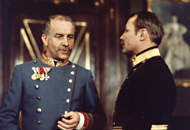I'm thinking back to the discussions we had about "The Night..." and I remember talking about how Hofmannsthal often used these characters to portray himself. After learning a little bit about Hofmannsthal through the reader as well as through Brandstatter, I would completely agree that "Lord Chandos" is really Hofmannsthal. Lord Chandos (Hofmannsthal) is upset about the way that language is becoming false and full of lies. No longer can communication be a true way to express oneself. Without truth in communication everything in his life will become a lie.
I think that the issues in the book are a bit psychological. Hofmannsthal had to put a lot of effort into writing this piece; while doing so, whether he intended to or not, he reflected his emotional and cognitive state. He was a very upset man. By looking at the example of how Lord Chando couldn't speak to his daughter, you could almost say that Hofmannsthal was almost becoming mad. I also, think that there is a bit that reaches the ethical point as well. As talked about in class, Hofmannsthal started to believe that language was becoming a lie; thus if he were to write something in this language, he too would be lying.
Sunday, February 3, 2008
Subscribe to:
Post Comments (Atom)



2 comments:
I agree that Hofmannsthal portrays himself in "A Letter" as Lord Chandos, however, I am interested in what your answer to the second in the prompt would be. What kind of struggle do you think Lord Chandos is struggling with? You mention that communication with language becomes a lie, I think that you should elaborate on that point.
Just as an example, say you were in France and you had no clue how to speak French. You would only be able to communicate through those jesters. The way that some people would interpret your gesture (society), would be completely wrong; just as you would be frustrated, same with Lord Chandos. He is frustrated because has feelings and can identify with what he wants to say, however, he doesn't have the means of saying it. This is why he is upset. The ethical part would show if he were to accept their answer to his gestures (the lie)... even if that isn't what he wanted.
Post a Comment